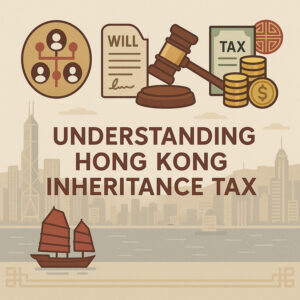Hong Kong inheritance tax is a common point of confusion for both residents and international investors.
Although Hong Kong abolished its estate duty in 2006, understanding how local inheritance laws apply is still critical, especially for high-net-worth individuals and expats with cross-border assets.
In this article, the following key topics will be covered:
- Existence of Hong Kong inheritance tax
- Hong Kong inheritance law and how it governs asset distribution
- Who is a tax resident in Hong Kong for inheritance purposes
- Hong Kong inheritance tax implications for residents
- Inheritance tax for non-residents in Hong Kong
- Legal and financial strategies for estate planning in Hong Kong
If you are looking to invest as an expat or high-net-worth individual, which is what I specialize in, you can email me (hello@adamfayed.com) or WhatsApp (+44-7393-450-837).
This includes if you are looking for a free expat portfolio review service to optimize your investments and identify growth prospects.
Some facts might change from the time of writing. Nothing written here is financial, legal, tax, or any kind of individual advice or a solicitation to invest.

Estate Tax vs Inheritance Tax: What’s the Difference in Hong Kong?
When discussing HK inheritance tax, it’s important to first understand the difference between estate tax and inheritance tax, as the two terms are often used interchangeably, but they’re not the same.
- Estate tax is levied on the total value of a deceased person’s estate before assets are distributed to beneficiaries.
- Inheritance tax, on the other hand, is paid by the individual beneficiaries who receive assets from the estate.
Does Hong Kong Have Inheritance Tax?

In Hong Kong’s case, neither estate nor inheritance tax currently applies.
The region abolished its estate duty (a form of estate tax) in 2006, and has not introduced any replacement inheritance or estate tax since.
This makes Hong Kong one of the most favorable jurisdictions globally for wealth transfer, especially when compared to countries like the US or UK, where estate and inheritance taxes can be significant.
Understanding the distinction between estate tax vs inheritance tax is critical for both residents and non-residents.
While Hong Kong does not levy these taxes, your home country might tax you on inherited assets depending on its own laws.
This makes international estate planning essential for those with cross-border ties.
The removal of estate duty was part of Hong Kong’s broader strategy to maintain its status as a competitive international financial center.
By eliminating taxes on wealth transfers at death, the government aimed to encourage capital investment and asset retention within the territory.
For residents, this means that beneficiaries typically receive inherited assets without incurring local tax liabilities upon the death of the asset holder.
For non-residents who own property or investments in Hong Kong, the same rule applies.
There is no local inheritance tax levied on the transfer of these assets.
Understanding Hong Kong Inheritance Law
Hong Kong inheritance law governs how a deceased person’s estate is distributed, whether or not they have left a valid will.
While the absence of inheritance tax makes Hong Kong attractive from a financial planning perspective, understanding the legal framework is just as important for ensuring a smooth transfer of assets.
Key Features of Succession Laws in Hong Kong
Succession in Hong Kong is primarily governed by the Inheritance (Provision for Family and Dependants) Ordinance and the Intestates’ Estates Ordinance.
These laws apply to individuals who are domiciled in Hong Kong at the time of their death or who own immovable property within the territory.
The legal system follows common law principles, and courts may intervene to ensure reasonable financial provision is made for dependents, even if a will states otherwise.
Role of Wills and Intestacy Rules
A legally valid will allows the deceased to control how their estate is distributed.
To be valid, a will must be in writing, signed by the testator, and witnessed by two people who are not beneficiaries.
When a person dies without a will, Hong Kong intestacy rules determine how assets are divided among surviving relatives.
These rules follow a fixed hierarchy. For example, if there is a surviving spouse and children, the estate is shared between them in specific proportions.
This can lead to unintended outcomes, which is why having a will is strongly recommended.
Legal Recognition of Foreign Wills
Foreign wills are recognized in Hong Kong, provided they comply with the formalities required in the jurisdiction where the will was executed.
However, if the estate includes immovable property in Hong Kong, local legal advice is advised to ensure the will is enforceable under Hong Kong law.
Cross-border families should pay particular attention to jurisdictional conflicts and may consider preparing a separate Hong Kong will for locally held assets.
This helps avoid probate delays and ensures compliance with local succession laws.
Who Is Considered a Tax Resident in Hong Kong?
Although Hong Kong does not impose inheritance or estate tax, understanding who is considered a tax resident in Hong Kong remains relevant for broader tax planning, especially when dealing with cross-border estates and succession issues.
Criteria for Individual and Corporate Tax Residency
In Hong Kong, individual tax residency is based on physical presence.
An individual is generally considered a tax resident if they:
- Reside in Hong Kong; or
- Stay in the territory for more than 180 days in a year, or more than 300 days over two consecutive years (counting both years).
For corporations, residency is determined by the location of central management and control.
A company is considered a Hong Kong tax resident if key decisions are made within Hong Kong, even if it is incorporated elsewhere.
Hong Kong’s tax system is territorial, meaning that only income sourced within the territory is taxable.
This is a key distinction from many other jurisdictions that tax based on residency or citizenship.
Implications for Estate and Succession Planning
While tax residency in Hong Kong does not directly affect inheritance—since no inheritance tax is levied—it can influence how other taxes apply, such as profits tax, stamp duty, and capital gains in the context of asset transfers or estate restructuring.
More importantly, tax residency matters for international estate planning.
For example:
- Non-residents who inherit Hong Kong assets may be taxed in their home jurisdictions, depending on local laws.
- Residents with global assets may need to structure their estate to avoid foreign inheritance taxes or double taxation.
Hong Kong Inheritance Tax for Residents
The absence of a formal Hong Kong inheritance tax for residents offers a significant advantage in estate planning.
Unlike many jurisdictions that impose taxes on inherited wealth, Hong Kong allows residents to transfer assets to heirs without triggering local inheritance or estate tax obligations.
Hong Kong Inheritance Tax for Non-Residents
Non-residents inheriting Hong Kong-based assets must still navigate several legal and tax-related considerations (particularly in their home countries) despite having no formal Hong Kong inheritance tax for them.
What Non-Residents Should Know When Inheriting Hong Kong Assets
Assets such as real estate, company shares, and bank accounts may be passed on without tax liabilities under Hong Kong law.
That said, non-residents are still subject to local succession procedures, including probate, which is required for accessing and transferring the deceased’s assets.
It’s also important to note that if the deceased held Hong Kong property or financial assets, the estate may still be subject to administrative fees, legal costs, and potentially stamp duty on asset transfers.
Tax Treatment in Their Home Country (General Overview)
Many jurisdictions, including the United States, United Kingdom, and several EU nations, impose inheritance or estate taxes based on the residency, domicile, or citizenship of the deceased or the beneficiary.
For example:
- A US citizen inheriting Hong Kong property may need to report the inheritance and potentially pay estate tax depending on the estate’s size.
- A UK-domiciled individual may be taxed on worldwide assets, including those inherited from Hong Kong.
Non-residents must consult tax professionals in their home country to understand the implications and available relief options, such as foreign tax credits or double taxation agreements, if applicable.
Reporting and Compliance Considerations
Even in the absence of Hong Kong inheritance tax for non-residents, beneficiaries may face compliance obligations such as:
- Filing inheritance declarations or reports in their home country
- Obtaining probate through the Hong Kong courts (or resealing foreign probate)
- Declaring foreign income if the inherited assets generate returns, such as rental income or dividends
Failing to properly report inherited assets could result in penalties, delays in accessing funds, or unintended tax liabilities.
To avoid complications, non-residents should work with both Hong Kong legal counsel and tax advisors in their home jurisdiction.
How the Absence of Inheritance Tax Affects Local Estate Planning
Without an inheritance tax, estate planning in Hong Kong focuses less on minimizing tax liabilities and more on ensuring efficient asset distribution, protecting family interests, and reducing the risk of disputes.
This simplifies the process for families, especially high-net-worth individuals, who might otherwise need complex structures to reduce tax exposure in countries with aggressive inheritance tax regimes.
However, this benefit does not eliminate the need for careful planning.
Residents should still consider succession laws, family dynamics, and the possibility of foreign tax exposure if beneficiaries are based overseas.
Wealth Transfer Options for Hong Kong Residents
Residents can transfer wealth through various tools such as:
- Wills to direct the distribution of assets
- Joint ownership of property for seamless succession
- Trusts to manage wealth across generations
- Life insurance policies with named beneficiaries
- Gifting strategies during their lifetime
Each approach carries different legal and practical implications, and selecting the right combination depends on family circumstances and asset types.
Stamp Duty and Other Indirect Taxes Related to Hong Kong Inheritance
While there is no inheritance tax, stamp duty may apply when transferring real estate or shares. For example:
- Transferring property to a beneficiary could trigger ad valorem stamp duty, unless it qualifies for an exemption (e.g. transfers between close relatives).
- Transferring shares in a Hong Kong company may also incur stamp duty at a rate of 0.1% (rounded up to the nearest dollar) on the transaction value.
Residents should factor in these indirect taxes when planning intergenerational asset transfers.
Planning Ahead: Legal and Tax Strategies for Global Families
For global families with assets in multiple jurisdictions, cross-border estate planning is essential.
While Hong Kong does not impose inheritance tax, beneficiaries may still face legal or tax obligations elsewhere, making proactive planning crucial.
Common strategies include setting up trusts to manage asset distribution, using life insurance to provide liquidity or cover potential foreign tax liabilities, and holding assets in structures that simplify succession, such as joint ownership or private investment companies.
Most importantly, working with qualified legal and tax advisors (both in Hong Kong and in your home country) ensures your estate plan is compliant, efficient, and tailored to your unique circumstances.
Planning ahead helps protect your wealth and ensures a smooth transfer of assets to the next generation.
Pained by financial indecision?

Adam is an internationally recognised author on financial matters with over 830million answer views on Quora, a widely sold book on Amazon, and a contributor on Forbes.



